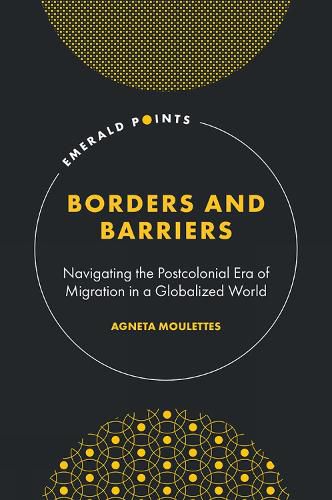Readings Newsletter
Become a Readings Member to make your shopping experience even easier.
Sign in or sign up for free!
You’re not far away from qualifying for FREE standard shipping within Australia
You’ve qualified for FREE standard shipping within Australia
The cart is loading…






In the vast expanse of human history, migration has been an ever-present phenomenon. People have sought new lands and opportunities, driven by diverse factors ranging from political turmoil and war to economic struggles, famine, and even the impact of climate change. However, our contemporary world is marked by a new era of globalization, where international institutions and organizations foster increased cooperation, leading to transformations in the capitalistic system and influencing migration in myriad ways.
Borders and Barriers: Navigating the Postcolonial Era of Migration in a Globalized World by Agneta Moulettes critically analyzes the intersection of national culture and immigration. Moulettes exposes how contemporary anti-immigrant narratives persist, starting with a concise overview of European and global colonial history and its justifications. She provides a comprehensive examination of colonialism's impact on countries like Great Britain, France, Belgium, Germany, Spain, Portugal, Denmark, and Sweden across Africa, America, and Asia, highlighting how internal colonialism manifests and casts the immigrant as the colonized, and the native population as the colonizer. Moulettes also explores the influence of colonial discourse on integration policies, cultural differences, and perceptions of national culture. This study engages critical management and postcolonial theories, questioning prevailing perspectives and scrutinizing policies promoting assimilation, immigrants' economic roles, and the dehumanization of minority groups.
This work is invaluable for scholars and researchers in migration studies, globalization, postcolonial studies, cultural studies, and political science, providing a comprehensive analysis of historical and contemporary migration trends and their intersection with globalization and colonial legacies.
$9.00 standard shipping within Australia
FREE standard shipping within Australia for orders over $100.00
Express & International shipping calculated at checkout
Stock availability can be subject to change without notice. We recommend calling the shop or contacting our online team to check availability of low stock items. Please see our Shopping Online page for more details.
In the vast expanse of human history, migration has been an ever-present phenomenon. People have sought new lands and opportunities, driven by diverse factors ranging from political turmoil and war to economic struggles, famine, and even the impact of climate change. However, our contemporary world is marked by a new era of globalization, where international institutions and organizations foster increased cooperation, leading to transformations in the capitalistic system and influencing migration in myriad ways.
Borders and Barriers: Navigating the Postcolonial Era of Migration in a Globalized World by Agneta Moulettes critically analyzes the intersection of national culture and immigration. Moulettes exposes how contemporary anti-immigrant narratives persist, starting with a concise overview of European and global colonial history and its justifications. She provides a comprehensive examination of colonialism's impact on countries like Great Britain, France, Belgium, Germany, Spain, Portugal, Denmark, and Sweden across Africa, America, and Asia, highlighting how internal colonialism manifests and casts the immigrant as the colonized, and the native population as the colonizer. Moulettes also explores the influence of colonial discourse on integration policies, cultural differences, and perceptions of national culture. This study engages critical management and postcolonial theories, questioning prevailing perspectives and scrutinizing policies promoting assimilation, immigrants' economic roles, and the dehumanization of minority groups.
This work is invaluable for scholars and researchers in migration studies, globalization, postcolonial studies, cultural studies, and political science, providing a comprehensive analysis of historical and contemporary migration trends and their intersection with globalization and colonial legacies.